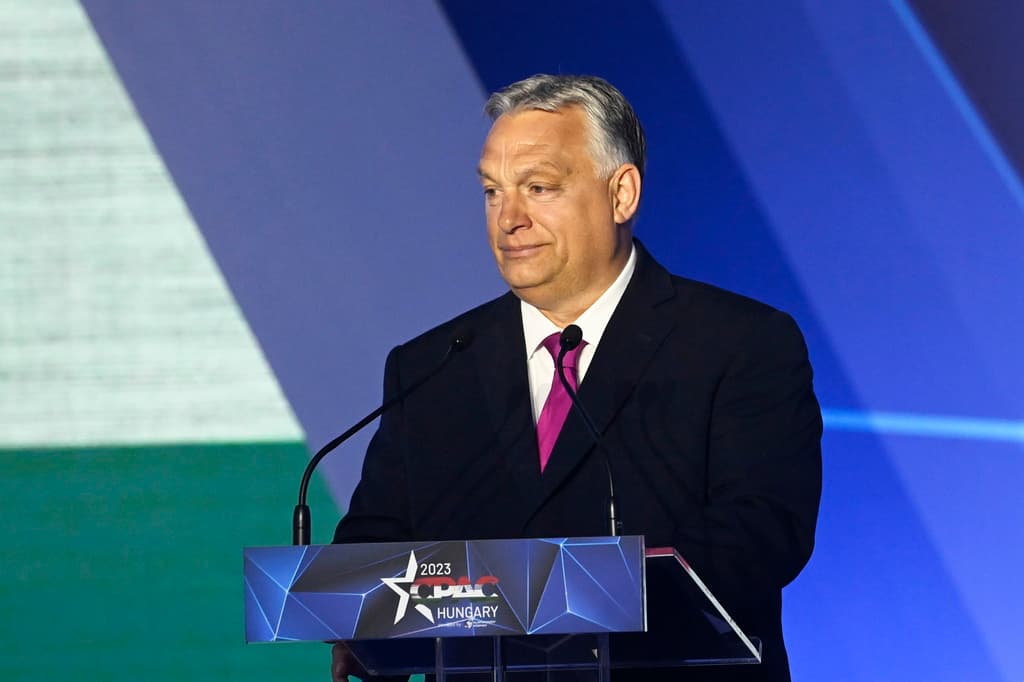Hungary’s Orbán, Taking Aim at EU, Ramps Up Rhetoric Against Ukraine — and America
Budapest’s outspoken premier seeks to ensure that political tensions simmer in an already overheated summer.

Count on Hungary’s prime minister, Viktor Orbán, to fire up the anti-Western rhetoric even in the middle of an unusually overheated European summer. In a speech given at a summer student festival in a Hungarian area of the Transylvania region of neighboring Romania this week, Mr. Orbán lambasted the EU as an “aging boxer with shrinking muscles.”
For the outspoken Hungarian, Brussels represents a “rich but weak union,” and “federalist governance in Europe” has spawned an “irresponsible empire.” At the annual summer gathering, the Hungarian leader also voiced opposition to the EU’s immigrant asylum reform and knocked “the EU’s LGBT+ offensive against the family-friendly nations of Europe.”
Mr. Orbán has long positioned himself as the chief defender of Europe’s “illiberal values” and he has been skeptical of the European Union. What is unusual in his recent remarks is his evocation of economic issues related to the war in Ukraine, an embattled country with which Hungary has had fraught relations.
While Mr. Orbán acknowledged as he has in the past that Russia “attacked Ukraine,” he also took aim at Washington, saying that “there is plenty of evidence,” though he failed to cite any, that “the United States, by pitting Ukraine against Russia and forcing the EU to abandon Russian energy sources, has become the only beneficiary of the war they have fomented in the center of Europe.”
This is a shocking demarche. The remarks, taken on their own, are vintage Orbán. The Hungarian leader was in April re-elected for a fourth consecutive term. Yet in the context of a lengthy war in the center of Europe and amid lowered expectations about the prospects of a much-touted counteroffensive for ejecting Russian troops from Ukrainian territory, they signify more than sound and fury.
That is because from Germany in the center of Europe to Greece in the south, the political zeitgeist at Budapest is beginning to reverberate in ways that a year ago no one could have predicted. In his speech, Mr. Orbán said, and not for the first time, that EU sanctions against Russia have failed. He called on Washington and Moscow to hold negotiations to end the war, with no mention of a Ukrainian role in any such talks: a familiar refrain sure to grate on the government at Kyiv.
The bigger question is not whether sanctions have failed, but whether they have succeeded. Russia’s exclusion from most Western commercial transactions could be construed as a deserved and effective smack on the Kremlin, but President Putin is a tough critter to outfox. On Monday night Moscow started attacking Ukrainian terminals on the Danube.
According to the Moscow Times, by hampering Ukraine’s grain exports, Russia wants to slash Ukrainian budget revenues and raise prices on the world market — for its sole benefit. At the same time Europeans are still grappling with food and energy prices markedly higher than before the Russian invasion of Ukraine.
In the first months all the blame fell at Mr. Putin’s feet, but now the EU’s strategy, and by extension America’s, is being openly called into question. Not only by Hungary, a party of the North Atlantic Treaty, but also by Germany’s increasingly powerful right-wing Alternative für Deutschland party.
So Budapest is not alone in castigating the West, even while nominally a part of it. After nearly a year and half of hostilities in Ukraine, old problems and predicaments on the Continent are gradually reasserting themselves.
A case in point is the crisis over the summer wildfires, which are straining resources in hard-hit areas like Greece. So far nearly 100,000 acres have burned, an area almost twice the size of the land burned in 2022 and three times what burned in 2020.
In August 2021, when forest fires ravaged the Arcadia region of Greece’s Peloponnese peninsula, Russia dispatched a pair of Ilyushin Il-76 airplanes and a number of Beriev Be-200 amphibious aircraft to help douse the flames. The Il-76 in particular is a large piece of equipment.
Despite logistical firefighting support from some fellow EU member countries in the current round of fires that are ravaging the Greek islands, Greece is still battling the blazes.
It is with smoke and fire in the background that a former Greek defense minister, Panos Kamennos, has called for Russia to offer its assistance once again. In a social media post, Mr. Kammennos wrote, “Without Beriev, nothing happens. Let’s bow our heads and ask for help now.”
In the current political climate that is unlikely to happen, though Greeks are bowing their heads right now for another reason. On Tuesday, one of the Greek air force’s small water-dropping Canadair planes crashed on the island of Evia, leaving its two young pilots dead and the armed forces in an official three-day period of mourning. So far no other Greek politician has seconded Mr. Kammennos’s plea for Russian planes as the fires burn on — at least, not publicly.

